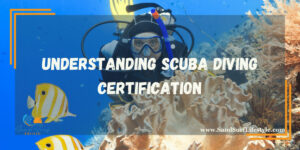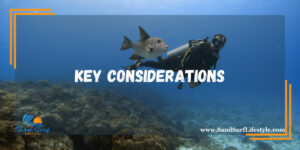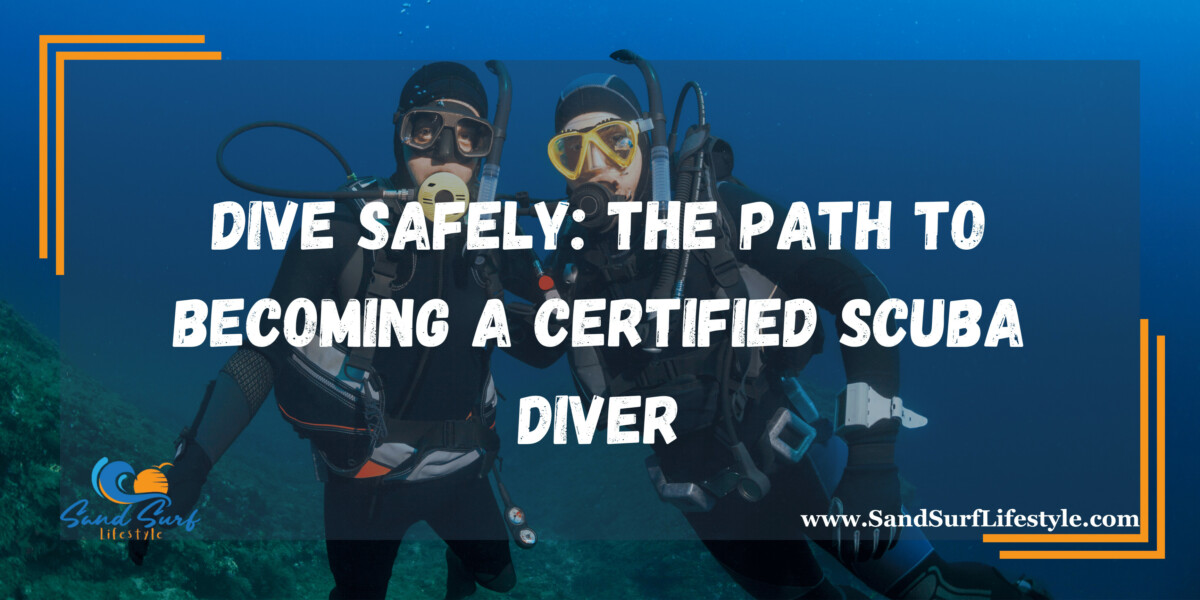Imagine plunging into the deep blue ocean, surrounded by vibrant marine life, exploring hidden underwater worlds that few have had the privilege to witness. Scuba diving offers an exhilarating and unique experience that allows you to venture beneath the surface and discover the wonders of the underwater realm. To embark on this captivating journey, obtaining a scuba diving certification is essential.
Understanding Scuba Diving Certification

Understanding the significance of scuba diving certification is essential before embarking on this underwater adventure. Scuba diving isn’t just a recreational activity; it’s a complex endeavor that involves specialized equipment, techniques, and safety protocols. Obtaining a scuba diving certification goes beyond a mere piece of paper; it’s a validation of your competence and readiness to explore the depths.
A scuba diving certification is tangible proof that you’ve undergone comprehensive training. It signifies that you possess the essential skills and knowledge required to navigate the underwater environment safely. From mastering buoyancy control to learning emergency procedures, the certification process equips you with the tools to handle various situations that might arise while diving.
Moreover, a scuba diving certification acts as your passport to a world of incredible underwater experiences. Many dive shops, resorts, and organizations worldwide mandate certification as a prerequisite before permitting access to their dive sites. This requirement ensures that every diver is well-prepared and aware of the responsibilities that come with underwater exploration.
With your certification in hand, you can explore diverse marine ecosystems, vibrant coral reefs, and captivating wrecks across the globe. Whether you dream of diving in the crystal-clear waters of the Caribbean or exploring the mysterious depths of the Pacific, your certification opens doors to limitless opportunities.
Scuba diving certification is more than just a piece of paper; it’s a gateway to a world of wonder and discovery. It signifies your dedication to safety, your commitment to honing your skills, and your desire to explore the breathtaking underwater realms that have fascinated humanity for generations. So, before strapping on your gear and venturing beneath the waves, take a moment to appreciate the significance of that certification and the incredible journey it promises.
To learn about the age requirements for scuba diving adventures, check out this article.
Step-by-Step Guide: How to Get Scuba Diving Certification
1. Research and Choose a Recognized Certification Agency
Before embarking on your scuba diving journey, it’s crucial to research and select a reputable certification agency. The scuba diving community recognizes organizations like PADI (Professional Association of Diving Instructors), NAUI (National Association of Underwater Instructors), and SSI (Scuba Schools International) for their established expertise and standardized training programs. These agencies have earned global recognition and trust due to their commitment to safety and quality. By choosing a recognized agency, you ensure that you’re receiving instruction from experts who adhere to industry best practices. This research phase sets the foundation for your entire certification process and contributes to your diving confidence and competence.
2. Select the Appropriate Course
Certification agencies offer a range of courses designed to cater to divers of varying skill levels. If you’re new to scuba diving, the Open Water Diver course is your ideal starting point. This comprehensive course introduces you to essential skills, safety protocols, and theoretical knowledge crucial for safe and enjoyable diving experiences. As a beginner, you’ll learn how to use diving equipment, maintain buoyancy, and handle emergency situations. The Open Water Diver course lays the groundwork for your scuba diving journey, ensuring you’re equipped with the fundamentals necessary for underwater exploration.
3. Enroll in the Course
Once you’ve identified the appropriate course, the next step is to enroll through a certified dive shop or training center affiliated with your chosen certification agency. These centers have instructors who are trained and authorized by the agency to provide expert guidance. Your chosen course will encompass various components, including theory sessions where you’ll gain theoretical knowledge, confined water training where you’ll practice skills in a controlled environment like a pool, and open water dives to apply what you’ve learned in actual dive conditions. Enrolling through a reputable training center ensures you’ll receive proper instruction, hands-on experience, and valuable insights from seasoned professionals, setting you on the path to becoming a skilled and certified scuba diver.
4. Theory and Knowledge Development
In the theory sessions of your scuba diving course, you’ll delve into the essential concepts that underpin safe and successful diving experiences. Dive into dive physics, learning how pressure and gases affect the body and equipment underwater. Gain insight into decompression theory, which guides your ascent to the surface to prevent decompression sickness. Understand equipment usage, from setting up your gear to troubleshooting potential issues. Dive deeper into underwater navigation techniques, vital for exploring dive sites and returning safely to your starting point. Safety protocols will be drilled into you, covering emergency procedures and contingency plans. The knowledge gained during theory sessions is more than theoretical—it forms the foundation for making informed decisions while diving and enhances your overall safety and confidence in the underwater environment.
5. Confined Water Training
Confined water training occurs in a controlled environment such as a pool, providing a safe space to practice foundational scuba skills. Experienced instructors guide you through assembling and using scuba equipment, ensuring you’re comfortable with every component. Develop the crucial skill of buoyancy control, which allows you to maintain your depth and position underwater effortlessly. Learn to clear your mask underwater, a skill essential for visibility and comfort during dives. Instructors simulate emergency scenarios, preparing you to manage unexpected situations like equipment malfunctions or running low on air. This controlled environment fosters a gradual progression in skill acquisition, instilling confidence and competence in your ability to handle challenges that might arise underwater.
6. Open Water Dives
The pinnacle of your scuba diving training is the series of open water dives. Here, you apply the knowledge and skills acquired in theory and confined water training to real-life dive scenarios. Guided by your instructors, you venture into natural settings like lakes or oceans, getting a firsthand taste of the underwater world. These dives assess your ability to implement what you’ve learned, focusing on safety, technique, and comfort. Instructors closely monitor your performance, offering guidance and feedback to refine your skills. The open water dives not only build your practical capabilities but also help you adapt to the unpredictability of the underwater environment. By the time you complete these dives, you’ll be well-equipped to embark on independent scuba adventures, exploring the beauty and mystery that lie beneath the waves.
7. Assessments and Examinations
As you progress through your scuba diving course, anticipate a series of assessments and examinations designed to gauge your comprehension of the material. Regular quizzes, exams, and practical assessments serve as checkpoints to ensure you’re absorbing the essential knowledge and skills necessary for safe diving practices. These evaluations also allow your instructors to identify areas where additional attention might be needed, enabling them to provide targeted guidance. By actively participating in assessments, you contribute to your own learning and the overall success of the course. Embrace these opportunities to solidify your understanding of dive theory, equipment usage, safety protocols, and more, as they ultimately equip you with the expertise required for confident and secure underwater exploration.
8. Complete the Course Requirements
To earn your scuba diving certification, it’s imperative to meet all the stipulated course requirements. This includes successfully mastering theory sessions, excelling in confined water exercises, and demonstrating proficiency in open water dives. Your instructor monitors your progress, offering guidance and feedback along the way. Their expertise ensures you’re prepared to tackle the challenges of the underwater world. Each component of the course contributes to your overall competency as a diver, enabling you to navigate various scenarios with confidence. Your instructor will assess your readiness for certification based on your performance, ensuring you’re well-prepared to venture into the depths as a certified scuba diver.
9. Obtain Your Certification
Upon successfully fulfilling the course requirements and demonstrating your grasp of essential scuba diving skills, you’ll be rewarded with a scuba diving certification card. This card is a tangible testament to your dedication and accomplishments, validating that you’ve completed the necessary training. With your certification in hand, you gain access to a world of diving opportunities. You can rent dive equipment, participate in organized dive trips, and explore underwater destinations across the globe. It signifies your readiness to dive safely and responsibly, in alignment with industry standards. Your scuba diving certification is more than a card—it’s a passport to thrilling adventures, unforgettable experiences, and the camaraderie of a global community of divers who share your passion for exploring the underwater realm.
Key Considerations

Safety First
Safety should be your top priority throughout your scuba diving journey. Adhere to the instructions provided by your instructors and strictly follow safety protocols. These guidelines are designed to protect you and ensure your well-being underwater. Never take shortcuts or risks that compromise safety. Additionally, continuously hone your diving skills through regular practice. This practice not only reinforces your abilities but also helps you react confidently in various diving situations.
Physical Fitness
Scuba diving requires a reasonable level of physical fitness to ensure comfort and safety underwater. Consult a medical professional before diving, especially if you have pre-existing health conditions. This precaution ensures that your body is equipped to handle the physiological demands of diving. Being in good physical shape improves your ability to manage buoyancy, handle equipment, and navigate underwater currents effectively.
Equipment Familiarity
Thoroughly understanding your scuba diving equipment is imperative for safe and enjoyable dives. Learn how each piece functions, from regulators to buoyancy control devices. Under the guidance of your instructor, practice assembling and disassembling your gear. Familiarity not only enhances your comfort but also enables you to troubleshoot any equipment issues that might arise during a dive.
Dive Planning and Buddy System
Before diving, master the art of dive planning. This involves assessing factors like dive depth, duration, air supply, and potential hazards. Proper planning reduces risks and increases your overall diving enjoyment. Additionally, always embrace the buddy system. Diving with a partner enhances safety as you can assist each other in emergencies and share the joy of underwater discoveries.
Environmental Awareness
Show respect for marine ecosystems by practicing responsible diving. Avoid touching or disturbing marine life, which helps maintain the delicate balance of underwater environments. Follow the principle of “leave only bubbles, take only memories.” Adhere to buoyancy control techniques to prevent damage to coral reefs and other sensitive habitats. By being an environmentally conscious diver, you contribute to the preservation of these remarkable ecosystems.
Continuing Education
After gaining your initial certification, consider furthering your skills through advanced courses. Specializations like underwater photography, wreck diving, and night diving not only add excitement to your diving experiences but also enhance your expertise. These courses deepen your knowledge and introduce you to new aspects of diving. Continuous learning not only makes diving more enjoyable but also helps you become a well-rounded and confident diver, ready to explore diverse underwater landscapes and challenges.
To discover how safe scuba diving is, check out this article.
Conclusion
Becoming a certified scuba diver is a journey that immerses you in a world of breathtaking beauty and unique experiences. By following the steps outlined in this guide, you can embark on your scuba diving adventure with confidence. Remember, scuba diving certification not only provides you with the skills to explore the underwater realm safely but also opens the door to a global community of fellow divers who share your passion for discovery and exploration.
Please note that the contents of this blog are for informational and entertainment purposes only and should not be construed as legal advice. Any action taken based on the information provided in this blog is solely at your own risk. Additionally, all images used in this blog are generated under the CC0 license of Creative Commons, which means they are free to use for any purpose without attribution.

